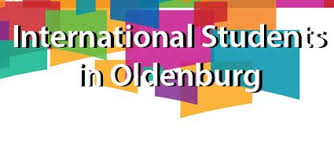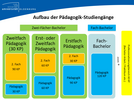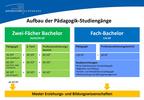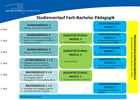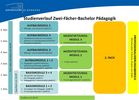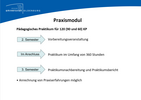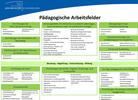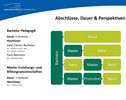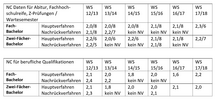Student Advisory Service Pedagogy
contact details
Coordinator for Studies and Teaching Faculty I
Internship Coordinator BA Pedagogy
Student Representatives
Psychological Counselling Service
Social Counselling of the Studentenwerk
List of all study advisors at the University of Oldenburg
Information for refugees (DAAD)
Student Advisory Service Pedagogy
Student Advisory Service Pedagogy
(Subject and Two Subjects Bachelor)
On this page you will find information on frequently asked questions about the Bachelor's programme in Education. As a student advisor I am at your disposal for further information by telephone, e-mail or chat. I would be happy to arrange an appointment for a personal consultation on site or in video chat.
Please note. At present, we do not offer any courses in English in the pedagogy programme.
General information for international and exchange students can be found on the pages of the International Student Office (ISO).
What distinguishes the pedagogy course in Oldenburg?
The study of pedagogy, through forms of teaching and learning that are linked to theory as well as to practice, enables academic qualification at university level, which enables competent action in pedagogical professional fields as well as theoretically founded, systematic reflections on pedagogical contexts and actions.
In pedagogy studies at the University of Oldenburg, emphasis is placed on addressing the diversity of social differences. The focus here is on ways of dealing with pedagogical action and pedagogical discourses, which, for example, deal with gender relations, migration-social distinctions, class or stratification relationships or the distinction between impairment/non-disturbance. The following topics can be studied in greater depth in the course of studies:
- Social pedagogy
- Migration and education
- Special and rehabilitation pedagogy
- Training and education management
A special feature is the three-semester project phase in the subject and two-subject Bachelor (90KP). Over two semesters, the students carry out their own small research tasks in groups of 5-12 persons or work on current research projects. While these student projects differ in their embedding in the various fields of study, they are also carried out in different contexts; there are external funded projects, qualification projects or evaluations of practical offers.
How is the study of pedagogy structured?
The six-semester course of study (standard period) comprises a total of 180 credit points (CP). These consisted of 120 credit points for the subject, 30 credit points for professionalisation modules, 15 credit points for the practical module and the bachelor thesis (15 credit points). The proportion of pedagogy in the subject bachelor is 120 CP and can be weighted with 30, 60 or 90 CP in the two-subject bachelor's (first or second subject). Depending on the chosen volume, your pedagogical studies consist of modules, which you complete with a module examination (term paper, presentation, oral examination, research report, portfolio, etc.).
You are free to choose the sequence in which you study the given modules, however, it is recommended to orientate yourself on the corresponding course of study plans. You can find the study plan for the Bachelor's degree here. The study plans (30KP/60KP/90KP) for the two-subject Bachelor can be found here. Forward-looking study planning is crucial. You will be supported in this by the student advisory service or you can obtain information from the Fachschaft Pädagogik.
What kind of internship do I have to complete during my studies?
Students in the subject of pedagogy complete a practical module of 15 credit points. This is obligatory for the subject bachelor and the two-subject bachelor with 90 CP in education. For two-subjects Bachelor with 60 CP pedagogy the practical module is voluntary, but in the second subject usually an internship must also be completed (see the general internship regulations of the university). The practical module is divided into a preparatory phase, the implementation of the internship and a follow-up phase. Under certain conditions, preliminary practical work can replace the performance of the internship. For further information please contact the internship coordinator.
When and how can I apply for a study place?
Applications are accepted for the winter semester. The current deadlines for the Bachelor's degree programmes at the University of Oldenburg (including the subject of pedagogy), which are restricted in admission, as well as a schedule for the award procedure can be found here.
How are the study places allocated in the application process?
If there are more applications for courses of study with restricted admission than there are places available, a selection procedure is carried out. From the available study places (at the first semester approx. 70 places each for subject and two-subject Bachelor), certain shares are initially reserved for special groups of applicants inside:
- 5% for foreign applicants* who are not on an equal footing with Germans
- 2% for cases of exceptional hardship
- 3% for second degree applicants
- up to 10% for authorized persons due to special professional qualifications
Before the actual selection procedure takes place, it is also checked whether there are applicants who are to be given preference. After deduction of the advance quotas described above
- 75% according to the result of the university's own selection procedure (numerus clausus) and
- 25% after the waiting period (waiting semester).
What does the admission restriction numerus clausus mean?
The numerus clausus (NC) is - in contrast to a widespread misunderstanding - not a value fixed before the award procedure. It is the result of the procedure for the allocation of study programmes with restricted admission and can only be communicated retrospectively. In this respect, the NC serves as an orientation for the applicants in terms of the average grade or the number of waiting semesters - as to how likely they are to be considered in future award procedures. However, the NC values vary from year to year because the number of applications received varies and the average grades and waiting times are therefore different. The following tables provide an overview of the NC values for the study programme Pedagogy (main and follow-up procedures) for the access authorisations Abitur, Fachhochschulreife, Z-Prüfungen and professional qualifications from the last few years. Further information on these values (also for other restricted Bachelor programmes at Oldenburg University) can be found here.
Can I be credited for achievements from other courses of study?
Modules or study achievements from previous study programmes (also diploma or master's degree), as well as professionally acquired competences can be credited. The prerequisite for this is that these are equivalent to the modules and the competencies to be acquired in the pedagogy course of study in Oldenburg. Credited modules no longer have to be studied. Frequently asked questions about recognition can be found here.
You can request crediting if you
- came to Oldenburg University from another place of study,
- have changed their subject combination at the University of Oldenburg,
- have rendered study abroad
- have professionally acquired skills.
Credits and, if applicable, placement in a higher semester are processed centrally by the Examinations Office in the first step "after receipt" of the application for a given semester (summer or winter). In a second step, these applications will be forwarded to the specialist representation (student advisory service). The application for crediting is only processed finally (i.e. crediting takes place) if you are enrolled in the relevant program.
In the past, it has turned out to be sensible to seek early discussion with the student advisory service. If you would like to apply for credits for a course of study in education, please contact me and make an appointment. You should bring all relevant documents with you (university performance records, certificates, certificates, module descriptions, and, if applicable, examination papers such as homework, etc.). In advance it is helpful to have a look at the study plan of your planned pedagogical study programme and to compare the modules provided there with the modules you have already completed.



